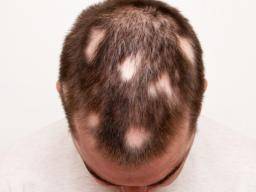Similar to the hair on the scalp, eyelashes also go through growth cycles, so shedding a few is usually no cause for concern. However, many injuries and illnesses can cause many or most of the eyelashes to fall out.
In this article, learn about why eyelashes fall out, as well as how to help them grow back, using medicines and home remedies.
Causes

Lash extentions, burns, and chemotherapy may lead to eyelash loss.
The following conditions can lead to eyelash loss:
Burns
According to the American Academy of Ophthalmology, if the eyelashes get singed but the hair follicles are still intact, the lashes will usually grow back in 6 weeks.
However, if the hair follicles were also damaged, the eyelashes might not grow back.
Chemotherapy
Medication used to treat cancer can sometimes cause the eyelashes to fall out. Not all chemotherapy drugs cause hair loss.
However, if a person uses a chemotherapy drug that is known to cause hair loss, it will affect the hair on the body as well as the scalp.
Body hair, eyebrows, and eyelashes are commonly affected. Usually, eyelashes start to grow back shortly after stopping chemotherapy.
Cutting
Most people do not cut their eyelashes. But for those that do, eyelashes typically grow back to their original length over time.
Pulled out
Trichotillomania is a psychological condition characterized by the impulse to pull out the hair.
This impulse can affect hair anywhere on the body, including the eyelashes. Lashes that have been pulled out may take a few months to grow back.
Lash extensions
Lash extensions are fibers that are glued onto the natural eyelashes to create a thicker, longer eyelash.
However, lash extensions can damage or rip the natural lashes. If natural eyelashes are lost due to lash extensions, they typically grow back in a few months.
Thyroid conditions
The thyroid gland produces hormones. If the gland produces too much or too little thyroid hormone, it can cause a variety of symptoms, including hair loss.
Eyelash loss can occur with both hyperthyroidism (overactive thyroid) and hypothyroidism (underactive thyroid). The lashes typically start to grow back after the thyroid imbalance has been treated.
Alopecia areata
Alopecia areata is an autoimmune condition that causes the body's immune system to attack the hair follicles.
The condition leads to hair loss on the scalp, eyebrows, and eyelashes. There is currently no cure for alopecia, but treatments are available that can help reduce symptoms.
Treatment

Eyelashes lost from chemotherapy may regrow.
In many instances, eyelashes lost from a burn or chemotherapy will regrow over time.
After chemotherapy, the eyelashes may grow back sparser, thicker, or the same as before.
If a thyroid condition or autoimmune disease caused eyelash loss, a person will likely need to treat the underlying health problem to stop the eyelashes from falling out.
The amount of time it takes for eyelashes to grow back varies depending on the cause and the extent of the eyelash loss.
Medication may also help eyelashes grow back. A doctor may prescribe bimatoprost in eye drop form.
One study looked at the use of bimatoprost in 41 people that had eyelash loss due to alopecia areata. The study participants applied 0.03 percent bimatoprost to the upper lash line daily for a year. About 70 percent of participants had some eyelash regrowth.

Do eyelashes grow back faster with home remedies?
There is a variety of home remedies that many people use to speed up eyelash growth. Popular home remedies for lash growth include olive oil, eyelash massage, and biotin products.
But will the eyelashes grow back faster if a person uses home remedies to treat lost lashes? The answer is probably not.
There is no scientific evidence that any home remedies will help eyelashes grow back. While biotin is thought to play a role in skin and hair health, there is limited research as to whether it promotes hair growth.
Prevention

Washing eye makeup off at night is recommended, as dry lashes may break or fall out.
While accidents happen and it is not always possible to prevent natural eyelash loss, there are some steps a person can take to reduce their risk. These include:
Eating a healthful diet: Certain nutritional deficiencies may contribute to hair loss. It is possible that these deficiencies could also affect the eyelashes. Nutrients that may play a role in hair health may include:
vitamin C
vitamin B
zinc
iron
protein
Avoiding eyelash curlers: People that use an eyelash curler may accidentally tug at their lashes, which can damage hair follicles.
Washing makeup off at night: Leaving eye makeup on overnight, especially mascara, can dry out the lashes. Dry lashes are more likely to break or fall out prematurely.
Rubbing the eyes: Rubbing the eyes too roughly can contribute to eyelash loss. The hairs are delicate, so be gentle when rubbing the eyes.
Just like the hair on the scalp, eyelashes have a natural growth cycle and frequently fall out. The loss of a few eyelashes is normal. However, extensive eyelash loss can occur for several reasons.
In many cases, eyelashes will grow back without treatment. For people who would like to speed up their eyelash growth, treatment may help.
If someone is unsure why their eyelashes are falling out, it is best to speak to with a doctor to determine the underlying cause.

No comments:
Post a Comment